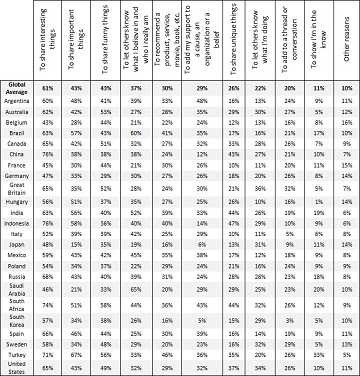Global "Sharers" on Social Media Sites Seek to Share Interesting (61%), Important (43%) and Funny (43%) Things
Four in ten (37%) of global online sharers indicate they do so `to let others know what I believe in and who I really am.' Three in ten select the following reasons: `to recommend a product, service, movie, book, etc' (30%), `to add my support to a cause, an organization or a belief' (29%) and `to share unique things' (26%). Two in ten choose `to let others know what I'm doing' (22%) and `to add to a thread or conversation' (20%) while one in ten say `to show I'm in the know' (11%) or `other reasons' (10%).
Those most likely to indicate they engage in sharing on social media sites `to share interesting things' are from China (76%), Indonesia (76%), South Africa (74%), Turkey (71%), Russia (68%), Spain (66%), Canada (65%), Great Britain (65%) and the United States (65%). Those countries in the middle of the ranking, still boasting majorities who select this reason, are from: Brazil (63%), India (63%), Australia (62%), Argentina (60%), Mexico (59%), Sweden (58%), South Korea (57%), Hungary (56%), Poland (54%), and Italy (52%). Those at the bottom of the list are from: Japan (48%), Germany (47%), Saudi Arabia (46%), France (45%) and Belgium (43%). `To share interesting things' (61% globally) is the top reason for social media sharing across nearly all countries surveyed except Saudi Arabia, where respondents are most likely to choose `to let others know what I believe in and who I really am' (65%) as their top reason.
These are findings of the research led by Ipsos Open Thinking Exchange (Ipsos OTX) collected by Ipsos Global @dvisor as part of Sociologue, an ongoing publication that features conversation-starting commentary on social media trends and behavior. The research was conducted on the "G@44"wave between April 2 and April 16th, 2013. The monthly Global @dvisor data output is derived from a balanced online sample in 24 countries around the world via the Ipsos Online Panel system. For the results of the survey presented herein, an international sample of 18,150 adults (12,420 "sharers") aged 18-64 in the US and Canada, and age 16-64 in all other countries, were interviewed. Approximately 1000+ individuals participated on a country by country basis via the Ipsos Online Panel with the exception of Argentina, Belgium, Hungary, Indonesia, Mexico, Poland, Russia, Saudi Arabia, South Africa, South Korea, Sweden and Turkey, where each have a sample approximately 500+. The precision of Ipsos online polls are calculated using a credibility interval. In this case, a poll of 1,000 is accurate to +/- 3.5 percentage points and one of 500 is accurate to +/- 5.0 percentage points in their respective general populations. In countries where internet penetration is approximately 60% or higher the data output is weighted to reflect the general population. Of the 24 countries surveyed, 15 yield results that are representative: Argentina, Australia, Belgium, Canada, France, Germany, Hungary, Italy, Japan, Poland, South Korea, Spain, Sweden, United Kingdom and United States. The nine remaining countries surveyed -Brazil (45.6% Internet penetration among the citizenry), China (41%), India (11.4%), Indonesia (22.1%), Mexico (36.5%), Russia (47.7%), Saudi Arabia (49%), South Africa (17.4%) and Turkey (45.7%)--have lower levels of connectivity therefore cannot be weighted to be general population representative; however, the online sample in these countries are particularly valuable in their own right as they are more urban/educated/income than their fellow citizens and are often referred to as "Upper Deck Consumer Citizens".
More data and full technical details are available in the Detailed Tables document on the right.
For more information on this news release please contact:
Jill Wiltfong Senior Vice President, Marketing Ipsos Open Thinking Exchange 310.736.3440 [email protected]
About Ipsos Open Thinking Exchange
Ipsos Open Thinking Exchange (Ipsos OTX) is Ipsos' global innovation center. This multi-disciplinary team of researchers, strategists, digital natives, and design technologists is blending advancements in technology and a cultural shift toward social interactions to create the future of research, one that is immersive, collaborative, authentic and relevant. SocialogueTM is an ongoing publication from Ipsos OTX which features proprietary, global infographics and commentary on social media trends and behavior. For more information on the current suite of Ipsos OTX social media research tools, to find more about our Futures initiatives or to obtain social media details by country, contact us at ipsosopenthinkingexc [email protected]
About Ipsos and Ipsos Global @dvisor
Ipsos is the world's third largest market research company. With offices in 84 countries, Ipsos offers a complete line of custom, syndicated, omnibus, panel and online research products and services. Ipsos Global @dvisor is a 25-country, online, monthly syndicated research service used to generate information for media and clients. Every month, we complete 500 to 1,000 online interviews in each country. For more information visit www.ipsosglobaladvisor.com or contact us at [email protected]




